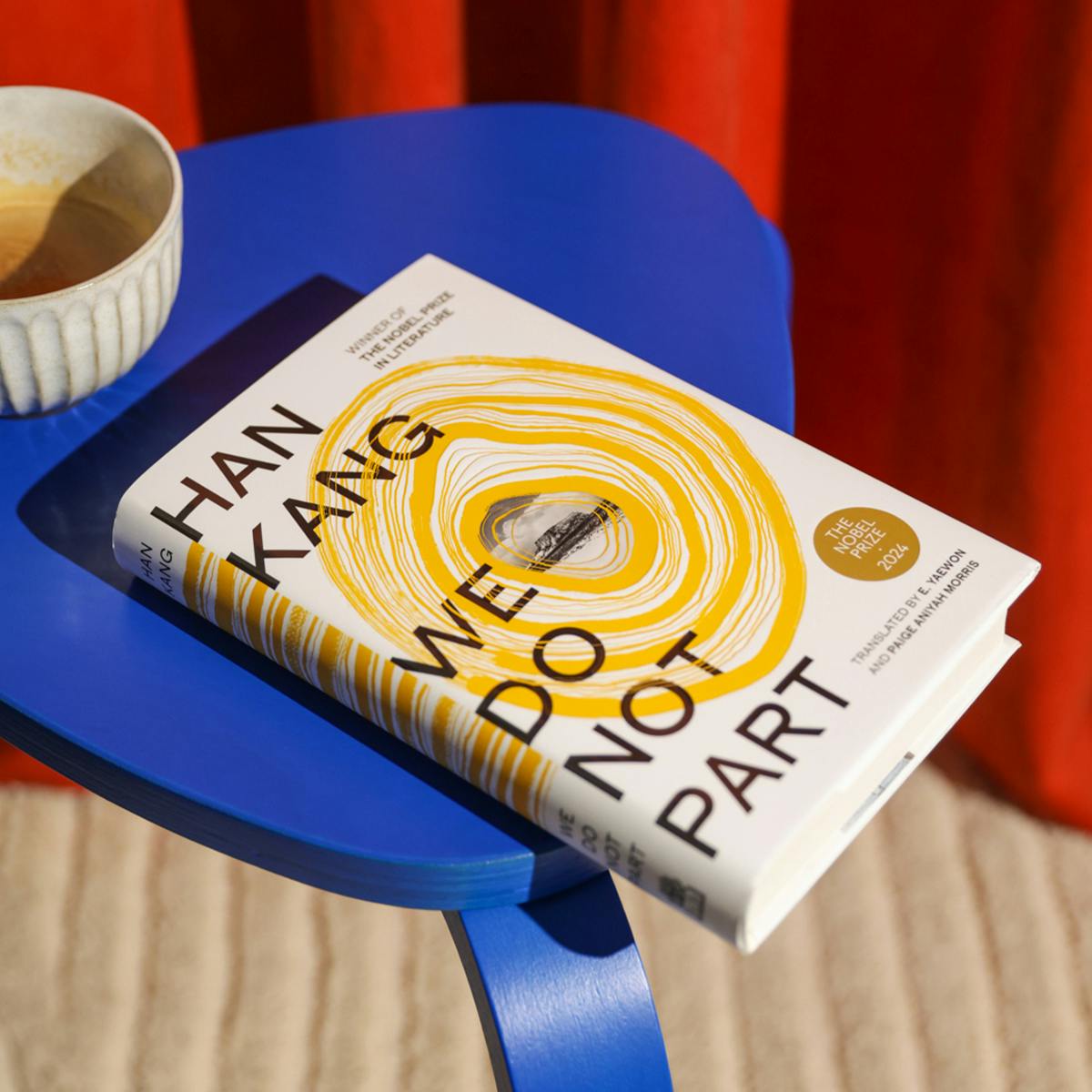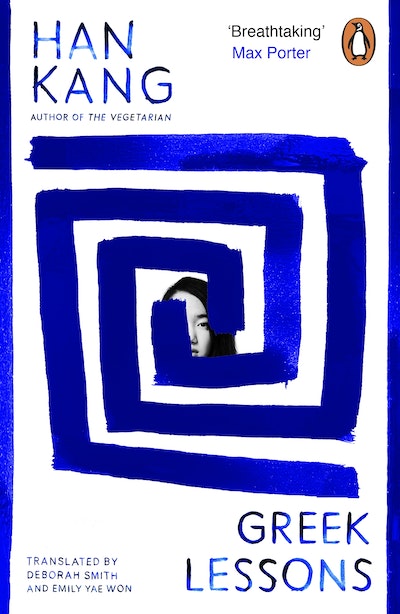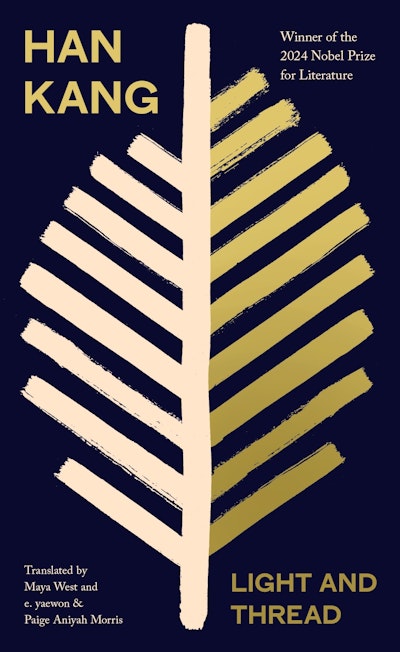- Published: 25 February 2025
- ISBN: 9780241600269
- Imprint: Hamish Hamilton
- Format: Hardback
- Pages: 384
- RRP: $39.99
We Do Not Part
- Published: 25 February 2025
- ISBN: 9780241600269
- Imprint: Hamish Hamilton
- Format: Hardback
- Pages: 384
- RRP: $39.99
Unforgettable . . . A disquietingly beautiful novel about the impossibility of waking up from the nightmare of history. Hang Kang’s prose, as delicate as footprints in the snow or a palimpsest of shadows, conjures up the specters haunting a nation, a family, a friendship
Hernan Diaz
A visionary novel about history, trauma, art and its tremendous costs. Han Kang is one of the most powerfully gifted writers in the world. With each work, she transforms her readers, and rewrites the possibilities of the novel as a form
Katie Kitamura
Han Kang. Behind these two syllables lies a novelist in the image of her latest translated work, We Do Not Part: fine, precise prose, with a poetry that willingly plunges into the fantastic, but sufficiently complex to conceal, beneath its praise of dreams and the imaginary, an implacable depiction of human cruelty
Le Monde
One of the greatest living writers . . . She is a voice for women, for truth and, above all, for the power of what literature can be
Eimear McBride
[Han Kang’s] empathy for vulnerable, often female, lives is palpable, and reinforced by her metaphorically charged prose . . . She has a unique awareness of the connections between body and soul, the living and the dead, and in a poetic and experimental style has become an innovator in contemporary prose
Nobel Prize in Literature Committee
Bold and revelatory, disquieting and subversive, Han’s style is both spare and lyrical
Guardian
A courageous and gifted writer whose work has truly global resonance . . . [Han Kang’s] writing is nuanced, supple and precise
Irish Times
A chilling reminder of the terrible invisibility of people and events that are removed from us in space and time
The New York Times
Exquisite. Han’s radiant intensity, her singular ability to find connections between body and soul, and to experiment with form and style, are what make her one of the world’s most important writers
Los Angeles Times
A haunting exploration of friendship amid historical trauma
TIME
A novelist and poet of tremendous feeling and precision . . . We Do Not Part [is] a beautiful, mysterious story built around . . . a pogrom on Jeju Island after the Korean War, told from the perspective of three women characters
The New Yorker
Astonishing . . . [We Do Not Part]is a rewarding endeavor, especially for readers familiar with Han’s oeuvre who can recognize it as a mosaic that artfully pieces together her long-simmering ideas on reckoning with historical atrocities, fighting to expose state-concealed truths and finding connection in our shared humanity despite inevitable suffering
San Francisco Chronicle
A masterpiece of grief and memory
Slate
The very best kind of storytelling
Vulture
[Kang] draws American readers into foreign calamities that their own forebears had a hand in creating, and then offers a very limited kind of redemption—the chance to discover, for themselves, that legacy of shame
The Atlantic
[We Do Not Part] blows open the lid on a long-forgotten chapter of Korean history, celebrating the resiliency of life in the face of immense tragedy
Harper’s Bazaar
It is pain—whether from large-scale acts of violence or quietly self-inflicted wounds—that gives [Han’s] writing its uncomfortable vitality
Wall Street Journal
A dream-narrative of history, remembrance, and friendship rendered in [Han’s] complex, lyrical prose
Literary Hub
Even through the veil of translation, the quiet intricacy of the author’s prose glitters throughout . . . a mysterious novel about history and friendship [that] offers no easy answers
Kirkus Reviews, starred review
Han Kang offers a devastating indictment of her country’s past . . . The novel conjures a dreamlike feel amid its potent tales of suffering and cruelty, all leading to a final section that is simply stunning. Han pulls off a masterful meditation on what it’s like to be assaulted by an "endless spew of blood-soaked memories". In that finale, I was stopped short by the grace of one dazzling page, with its cascade of memorable images. These include a description of mental collapse as hundreds of fuses in one’s head blowing one by one, and a woman sleeping all day in a hospice, who reminds Khungha of "a sea where the high tide lasts forever". Han ends her magnificent novel on a beautifully beguiling note
Independent, ‘Novel of the month’
A masterpiece . . . We Do Not Part is both act of witness and a beautiful poetic object . . . It is a rare privilege to read a masterpiece so recently crafted, to know that the new prose you are reading (too fast!) will endure. We Do Not Part is an astonishing book
Anne Enright, Guardian
With patience and acute insight, [Han Kang] explores both the breadth and brutality of human cruelty, and the profound capacity of our species for tenderness . . . We Do Not Part strikes a match in the darkness, insists on the strength of sisterhood, and makes us believe that even the smallest of lives, the pulse of a bird’s heart, should matter
Financial Times
Han’s work – itself a radical form of outreach and connection, an attempt to feel into the painful lives of strangers – is highly original and moving. Although she refuses to look away from human cruelty, it is her glimmers of hope that are most affecting . . . There is, perhaps, no novelist working today who seems so devoted to interrogating the epistemic problem of suffering
New Statesman
A powerful and singular achievement
Daily Mail
Vivid, nail-biting . . . written in prose of extraordinary visual and sensory precision, this is a ghost story of uncommon power and literary depth
Buzz Mag
This might be Han’s best novel yet . . . The Korean 2024 Nobel laureate combines the strangeness of The Vegetarian and the political history in Human Acts to extraordinary effect in her latest novel.
Guardian, 'Five of the best translated fiction of 2025'
The power of this narrative comes from Han Kang's masterful fusion of the literary and the documentary
The Economist, 'Books of the Year'
The long tail of state violence haunts this surreal, intimate story of friendship . . . Han uses a powerful form of indirect storytelling: Readers glimpse the atrocity only through layers—of disturbing memory, newspaper snippets, official documents. The composite record builds subtly and slowly, almost arduously. But in the process, Han reveals how trauma that has yet to receive a full accounting can act like a damaged nerve, and she makes an eloquent case for revisiting it, agonizing though that might be
The Atlantic, 'The Best Books of 2025'
Han Kang’s pristine and enigmatic 11th novel is the story of two friends, Kyungha and Inseon, haunted by a massacre of civilian activists on an unnamed island . . . Kyungha’s journey to save one small life becomes a quest to receive and to honor the memories of the lost
Slate, 'The 10 Best Books of 2025'
The latest from the 2024 Nobel Prize in Literature winner is fundamentally a novel about disturbed sleep – and it shows, with plots and settings that move around you as you read like parts of a dream. It’s the perfect subject to bring out Kang’s characteristic sparse and poetic language. Insomniac Kyungha receives a call from an old friend in the hospital, and travels through a snowstorm to take care of their pet birds. Intricate and surreal, We Do Not Part blurs the boundaries between narrative, nightmares and the dark history of South Korea’s Jeju Island
GQ, 'The best books of 2025'
Mesmerising . . . This might be Han’s best novel yet
Guardian, 'Best Books of 2025: Fiction in Translation'
The Nobel-prizewinning novelist chronicles shameful episodes in South Korea’s history. The power of this narrative comes from Han Kang’s masterful fusion of the literary and the documentary
The Economist, 'The Best Books of 2025'








